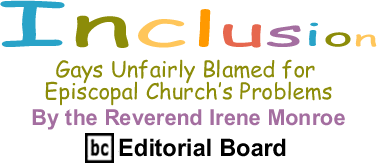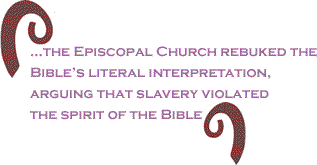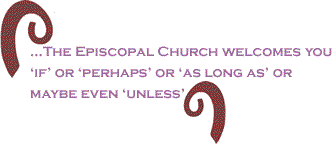
|
|||||||||||||||||||||
 |
|||||||||||||||||||||
|
||||||||||
 |
||||||||||
|
||||||||||
The current issue is always free to everyone If
you need the access available to a |
||||||||||
 |
||||||||||
Is the Episcopal Church’s impeding schism really about the theological rift that sprung up after the consecration of its first openly gay bishop, the Rev. V. Gene Robinson of New Hampshire? Or, is the brouhaha really about a church in battle with itself about how to be financially solvent and theologically relevant in today’s competitive religious marketplace? Last weekend, the Episcopal Diocese of Pittsburgh voted in favor of separating from the national church over theological beliefs on homosexuality. “What we’re trying to do is state clearly in the United States for the authority of Scripture,” Bishop Robert W. Duncan of Pittsburgh said after the vote. “The vote was necessary, because the more liberal bishops now in the majority in the national Church have hijacked my church, and that’s how most of the people here feel.” Duncan, a former seminary classmate of Robinson's, is also the current moderator of the Anglican Communion Network (ACN), a theologically conservative network of diocese and parishes, working toward realignment by passing anti-gay initiatives. And Duncan has been using the “authority of Scripture” argument to fight his battle. But “authority of Scripture” doesn’t hold weight here because the Episcopal Church has always been challenged on this issue. In the 1970s, the argument for authority of Scripture came up with the ordination of women – and so, too, did the threat of a schism. But in 1989, the Church consecrated its first female bishop – Barbara C. Harris. And conservatives like Duncan were not only theologically outraged, but also racially challenged because Harris is African American.
And just last year, gasps of both exhilaration and exasperation reverberated throughout the Anglican Communion when it was announced that Katharine Jefferts Schori would be the Presiding Bishop of the Episcopal Church USA. Schori not only supports gay unions, but she also backed the holy consecration of Robinson. All this is not surprise, however, since the Episcopal Church has a history of taking the moral high ground on social justice issues. On the theological rift concerning American slavery, the Episcopal Church rebuked the Bible’s literal interpretation, arguing that slavery violated the spirit of the Bible. Boston's Old North Church, which played an active role in the American Revolution, served as a beacon for Paul Revere’s “midnight ride.” The Emmanuel Episcopal Church in Cumberland, Md., was a major stop on the Underground Railroad. And both Trinity Parish on Wall Street, and St. Paul's Chapel, which George Washington once attended, have become the spiritual center of Ground Zero since the 9/11 terrorist attacks. The Episcopal Church prides itself on being an inclusive, worshiping body. It even launched a national ad campaign stating, “The Episcopal Church Welcomes You,” and “ We’re Here For You,” to promote its message. Its message is not for everyone.
But National Episcopal AIDS Coalition co-chair Bruce Garner got the message. In his acceptance speech for the first Faith in Action Award presented by the Atlanta Interfaith AIDS Network in November, 2004, Garner offered this admonition:
But the Episcopal Church’s real issue is not Bishop Gene Robinson at all. And Robinson said so in the pages of the Concord Monitor:
And with the changing demographics, both nationally and globally, of this ecclesial body, the Church’s once-upon-a-time ruling “Frozen Chosen,” whose anti-gay initiatives had a stranglehold on the Church’s governing future, find that their efforts to maintain a respected voice among its constituents is like that of today’s Republican Party – dead on arrival. In David D Kirkpatrick’s recent New York Times Magazine article, “End Times for Evangelicals,” he wrote:
While many would like to believe that the financial crisis in the Episcopal Church is brought on by secessionist congregations battling with liberal bishops endorsing sodomy, the church's coffers were bare prior to Robinson’s consecration. And the reason? Decline in its membership over four decades, the rise of its Third World bishops from countries in Africa, South America, and Asia, and its egregious act of inhospitality and exclusion of its lesbian, gay, bisexual and transgender population. Using Robinson as the reason for the church’s problem IS the problem. BlackCommentator.com Editorial Board member, the Rev. Irene Monroe is a religion columnist, theologian, and public speaker. A native of Brooklyn, Rev. Monroe is a graduate from Wellesley College and Union Theological Seminary at Columbia University, and served as a pastor at an African-American church before coming to Harvard Divinity School for her doctorate as a Ford Fellow. Reverend Monroe’s “Let Your Light Shine Like a Rainbow 365 Days a Year - Meditations on Bible Prayers" will be out in June, 2008. As an African American feminist theologian, she speaks for a sector of society that is frequently invisible. Her website is irenemonroe.com. Click here to contact the Rev. Monroe. |
||||||||||
| November
8 , 2007 Issue 252 |
|
| Printer Friendly Version in resizeable plain text format format |
 |
 |
 |
| |
| |































